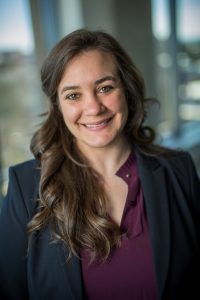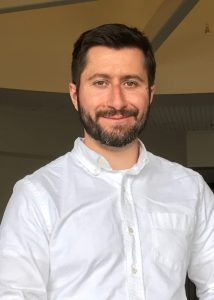University of North Carolina Lineberger Comprehensive Cancer Center presented the Graduate Fellow Awards in Basic Science to Megan Agajanian, Anthony Arceci and Salma Azam.
The annual competitive award recognizes outstanding graduate students who are working in the laboratories of UNC Lineberger members, and are in their final year of training. Each award winner also receives a $3,000 prize, which is funded by private donations.
“We are proud to recognize the work of these outstanding graduate students,” said UNC Lineberger’s Adrienne Cox, PhD, who chaired the awards selection committee.
Agajanian was honored for her achievements while working in the lab of Benjamin Major, PhD, a former UNC Lineberger member who recently joined the faculty at Washington University in St. Louis.

Before even entering Major’s lab, Agajanian was the first author of two papers while earning her master’s degree. Since starting in Major’s lab in May 2016, she has first-authored a paper published in Cell Reports. The paper focused on studying the WNT pathway, a signaling pathway that is a major driver of various cancers.
In addition, she was awarded independent funding from the National Cancer Institute and other organizations, presented at national conferences, won scientific awards for her presentations, and mentored new scientists in the lab. She also earned the Howard Hughes Medical Institute Gilliam Fellow Award.
“Within my team, she has been spectacular,” Major wrote in his recommendation letter. “Her data are well-controlled, always quantified and more often than not reproduce across her biological replicates. She synthesizes the literature, and incorporates the understanding into experimental design. She is among the hardest workers of graduate students at UNC, easily averaging 60-65 hours of research/week.”
During his time working in the laboratory of UNC Lineberger’s Michael J. Emanuele, PhD, Arceci contributed to five publications, including a first-author paper in Cell Reports, and he demonstrated an ability to work collaboratively and as a leader, Emanuele reported in his nomination. Arceci’s work focused on discovering and validating enzyme-substrate relations between enzymes that regulate protein degradation, and proteins involved in the cell cycle, which controls cell growth.

Outside of the lab, Arceci was a member of a UNC-Chapel Hill team that advanced to the finals in a National Institutes of Health-sponsored “Neuro Start-up Challenge,” was an instructor at a science, technology engineering and math-based summer camp for high school students, and received a scholarship to carry out an industry internship.
“He is energetic, thoughtful, and fully intellectually engaged in his project,” Emanuele wrote. “He considers the minuscule details about why experiments may or may not work, while also seeing the 30,000-foot view of its implications in cell biology and potentially disease.”
Azam was honored for her work in the lab of UNC Lineberger’s Chad Pecot, MD, which she joined in 2014.
Before coming to Pecot’s lab, Azam received her undergraduate degree in just three years at UNC-Chapel Hill with the highest honors, while completing a senior honor’s thesis.
Azam has amassed “an impressive body of work” on the role of a protein called Quaking in blood vessel development and cancer metastasis while working in the Pecot lab. She will have 15 publications, including three papers as a first author, and others as a co-author. Recently, she was first author of a paper published in Oncogene. Outside the laboratory, she has been involved in significant outreach and leadership activities.

In addition, Azam was a member of UNC’s Graduate Program in Translational Medicine, which allowed her to shadow Pecot in the clinic – experiences which helped solidify a decision to pursue a career in industry to develop cancer therapeutics.
“She has generated some beautiful data I am quite proud of, and I believe the current directions of her project are innovative, and likely to uncover several findings with great relevance and importance for the development of novel tumor angiogenesis therapeutics,” Pecot said.
